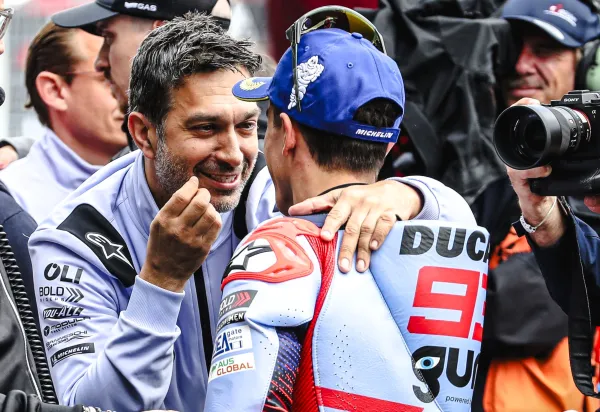**Frankie Carchedi EXCLUSIVE: “If we had Marc Marquez’s first win earlier…”**
In the world of MotoGP, few names evoke as much passion and excitement as Marc Marquez. The Spanish rider has not only rewritten the record books with his incredible performances but has also changed the dynamics within the sport itself. Frankie Carchedi, Marquez’s long-time crew chief, recently shared his insights and reflections on Marquez’s journey, particularly focusing on the significant milestones that have shaped their careers.
As we sat down for this exclusive interview, I couldn’t help but notice the enthusiasm radiating from Carchedi when he spoke about Marquez’s first win at the 2013 MotoGP season in Circuit of the Americas. His pride was palpable, but it was also accompanied by a thought-provoking contemplative tone. “If we had Marc Marquez’s first win earlier in his career,” Carchedi stated, “who knows how much further he could have pushed the limits of what’s possible in this sport.”
**The Impact of Early Success**
To understand the implications of an earlier victory for Marquez, we need to look back at the trajectory of his career. Marquez burst onto the scene with an impressive Moto2 campaign, showcasing his raw talent and fearless riding style. However, the jump to the elite level of MotoGP presented a new world of challenges, not just in terms of competition but also in adapting to the nuances of a different machinery and the psychological aspects of racing at the top.
Carchedi elaborated on how an early win could have boosted not just Marquez’s confidence but also the dynamics within the Repsol Honda team. “When you achieve success early on, it sets a positive tone,” he explained. “It enables you to believe in your abilities right from the start. It could have transformed our approach to the following races and altered strategies, perhaps even how our rivals perceived us.”
Reflecting on the implications, Carchedi highlighted how early success breeds momentum. “You think about guys like Valentino Rossi or Giacomo Agostini,” he remarked, referencing the legends of the sport. “They didn’t just win; they created a legacy of early achievements that made them almost untouchable. The racers around them knew they were dealing with a force from the very beginning.”
**The Psychological Edge**
The mental aspect of racing cannot be overstated. Carchedi emphasized that racing is as much about the mind as it is about physical skill. “In this sport, self-belief and confidence are key,” he pointed out. “If Marc had gotten that win right out of the gates, it would have sent a message to everyone: ‘I’m here, and I’m ready to fight for the championship.'”
Marquez’s rise was marked by successive wins, dominating the sport in a way rarely seen. But Carchedi’s notion of an early win underscores the potential psychological advantage that could have been harnessed. “It would not just have propelled Marc; it would have altered how other teams and riders would prepare for him,” he said. “Fear can be a powerful motivator.”
**Tactical Considerations**
Carchedi shared insights about the tactical shifts that would have likely occurred had Marquez experienced that success earlier. “Think about the race strategies we devised during that first season,” he mused. “We were still in discovery mode, flesh out the finer details of the bike, the electronics, and tire management. If we had an earlier win, it would have forced us to innovate even faster, rather than play it safe.”
The importance of adaptability in MotoGP cannot be understated. Teams are constantly adjusting strategies based on performance, track conditions, and competition. An early victory for Marquez would have hastened the need for his rivals, like Yamaha and Ducati, to ramp up their game as well. “There’s this chess-like element in MotoGP, and that early win could have changed the entire strategy on how we approached racing in 2013,” Carchedi remarked.
**A Legacy in the Making**
As we delved deeper into the hypothetical scenario of an earlier victory, Carchedi couldn’t help but reflect on how it would have changed the legacy of Marquez. “Marc has created a legacy regardless,” he noted. “But there’s something alluring about the idea of having had that ‘wow’ moment sooner. Would he be seen as the winningest rider of all time much earlier? Or even have a different set of rivalries?”
Carchedi suggested that rivalries are essential in sports; they ignite the passion of fans and fuel the fire within the competitors. The early establishment of Marc as a dominant force might have created rivalries with other champions like Jorge Lorenzo and Valentino Rossi on a different timeline. “Imagine if we had seen those epic battles even earlier. It adds another layer to the drama of the sport,” he said.
**Looking Ahead**
Despite the what-ifs, Carchedi remained steadfast in his belief that Marquez’s journey is far from over. “If anything, the twists and turns of his career have made him stronger and more resilient,” he insisted. As the conversation shifted to the future, Carchedi included the importance of innovation and adaptability, key traits that would continue to pay dividends in the coming seasons.
He finished with a reflection that encapsulated both the uncertainty and thrill of MotoGP. “In this sport, you can have all the strategy and preparation in the world, but at the end of the day, it comes down to the rider and their skill in that fraction of a second. Whatever happens, Marc’s impact is undeniable, and we are excited to see where his journey takes him next.”
As I concluded my conversation with Frankie Carchedi, it was evident that while Marc Marquez’s path has been extraordinary, the chess game of racing holds countless scenarios, each shaping the future of MotoGP in unique and unpredictable ways.


